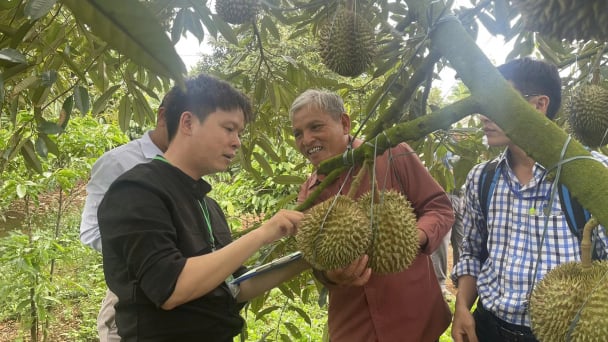May 31, 2025 | 21:57 GMT +7
May 31, 2025 | 21:57 GMT +7
Hotline: 0913.378.918
May 31, 2025 | 21:57 GMT +7
Hotline: 0913.378.918

The workshop "Building an Action Plan to Adapt to EUDR Regulations" in Ho Chi Minh City on May 4. Image: VFCO.
The EU Deforestation Regulation (EUDR) aims to reduce deforestation and forest degradation while also helping to safeguard the environment and mitigate climate change.
As a result, agricultural commodities entering the EU market must satisfy and demonstrate requirements for deforestation and forest degradation along the supply chain. EUDR governs seven commercial areas in the EU: forestry and lumber products, rubber, coffee, cocoa, cattle, palm oil, and soybeans. EUDR laws are expected to have a substantial impact on Vietnam's three sectors: coffee, rubber, timber, and forest products.
On May 4, 2024, in Ho Chi Minh City, VRG will collaborate with the Forestry Science Institute of Vietnam and the Office of Sustainable Forest Management Certification (VFCO) to organize a workshop on "Developing an Action Plan to Adapt to EUDR Regulations."
Mr. Tran Cong Kha, Chairman of VRG, attended the session, as did VRG's executive team and around 100 delegates, including leaders and technical staff from 63 rubber companies. At the workshop, Mr. Tran Lam Dong, Deputy Director of the Forestry Science Institute of Vietnam, and Mr. Vu Tan Phuong, Director of VFCO, shared EUDR requirements and discussed the draft PEFC standards on the EUDR Due Diligence System (PEFC EUDR DDS).
The workshop discussed and agreed to prepare for EUDR implementation by establishing EUDR DDS, increasing capacity, and integrating PEFC EUDR certification into the National Forest Certification System (VFCS/PEFC). VFCO will continue to work closely with PEFC and VRG to promote sustainable rubber sector development by implementing QLRBV certification and product traceability (CoC) linked to the EUDR Due Diligence System (PEFC EUDR DDS).

Owning sustainable forest management certification is a goal of VRG. Photo: Tung Dinh.
The Green Growth and Sustainable Development Strategy is well-known as one of VRG's key programs aimed at achieving three goals at once: economic development, environmental conservation, and community and social responsibility. As a result, the plan is designed to meet Vietnam's and the world's sustainable development trends, thereby directly contributing to the reduction of greenhouse gas emissions and the transition to a long-term carbon neutral economy.
VRG's Green Growth and Sustainable Development Strategy aims to build on successful sustainable development initiatives launched between 2019 and 2023. In terms of the supply chain, the firm hopes that by 2030, 60% of rubber and planted forest lands will have achieved VFCS/PEFC sustainable forest management certification, and 100% of rubber processing units will have product traceability certification.
By 2050, the entire corporation hopes to have VFCS/PEFC sustainable forest management certification for all rubber and planted forest areas, as well as product traceability certification for all production facilities (latex, timber, rubber industrial products, etc).
Translated by Linh Linh

(VAN) For the durian industry to succeed, the value chain must fulfill its commitments to the government, the community, and international partners.

(VAN) Vaccinating juvenile pangasius helps reduce disease, antibiotic use, and farming costs, increasing profits for export-oriented farmers in An Giang.

(VAN) Due to a limited supply of workforce and competitive recruitment requirements, businesses struggle to retain talented veterinary human resources.

(VAN) WOAH’s guidance aims to mitigate disease risks through a One Health approach that balances economic, conservation, and public health interests.

(VAN) Ms. Nguyen Thi Dung, Deputy Director of Ngoc Hoang Cooperative, shared about the journey of bringing dragon fruit to Europe, achieving annual revenues in the billions of VND.

(VAN) Bamboo products from Thang Tho Bamboo Cooperative have reached many countries around the world, while also creating jobs for local workers.

(VAN) The Management Board of Con Dao National Park reported that a green sea turtle, tagged in the Philippines, has traveled thousands of kilometers to lay 84 eggs on Bay Canh Islet.